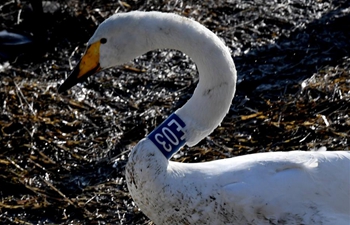BERLIN, Nov. 27 (Xinhua) -- German voters are divided over the question of whether the new United Nations migration compact will lead to a rise in asylum claims, according to a study seen by the German press agency (DPA) on Tuesday.
According to the study, just under 40 percent of citizens were concerned that foreigners could be granted additional rights to humanitarian stay. Another 40 percent said that they did not know, or did not want to answer the question, while 22.7 percent saw no risk of an increase in asylum claims.
The findings were based on a survey of 2,026 respondents which was conducted by the Insa opinion research institute for the "Value Union" association, which was formed by conservative Christian Democratic Union (CDU) and Christian Social Union (CSU) members.
Although Germany's federal government is officially supportive of the UN migration compact, some CDU/CSU politicians, including health minister Jens Spahn (CDU) have criticized its wording and successfully called for the party to re-open discussions on the subject.
The document in question, which is technically speaking only a declaration of intent, is scheduled to be passed formally at a special UN summit in Morocco in mid-December.
According to the UN, its key four objectives are to ease the pressure on host countries, enhance refugee self-reliance, expand access to third-country solutions, and support conditions in countries of origin for return in safety and dignity.
Although the compact largely builds on existing international law, a handful of countries, including the United States, Austria and Hungary, have already announced that they will refuse to add their signatures.
Representatives from these states have cited concerns that doing so could limit their national sovereignty and complained that the pact failed to distinguish between regular migrants and refugees.
Aside from health minister Spahn, who is one of the candidates to succeed German Chancellor Angela Merkel as CDU leader, the far-right Alternative for Germany (AfD) has also repeatedly attacked the compact.
In a recent example of the party's traditional anti-establishment and anti-immigration rhetoric, AfD co-leader Alexander Gauland has described the UN's efforts to promote multilateral cooperation on migration with the document as part of an agenda of "leftist dreamers and globalist elites".
Merkel has publicly defended the compact as being in Germany's "national interest" because it could help improve migratory conditions across the world. The veteran chancellor has also highlighted that the agreement is not legally binding and has no bearing on national laws.
Nevertheless, Alexander Mitsch, Federal Chairman of the "Value Union", argued on Tuesday that the Insa survey showcased that the CDU/CSU needed to take the related worries of people seriously and ensure that Berlin did not enter any incalculable obligations with regards to migration and asylum.
"This is why it should at least be enshrined in a protocol statement that German rejects any future legally-binding character or consequences from the pact," Mitsch told DPA.
The CDU is currently scheduled to hold a debate and vote on the compact at its upcoming party conference in early December.
The event will also witness a closely-watched ballot among federal CDU delegates to elect a successor to party leader Merkel who has announced that she will not run for another term after 18 years in the post.













